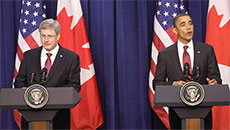WASHINGTON - A certain Canadian pipeline appears poised to spring back to the top of the American political agenda, with the upcoming congressional elections setting the stage for a vote on the long-delayed Keystone XL project.
Republicans have all but declared that they would try to use their new dominance in Congress to push through a Keystone bill, should they win the Senate in three weeks as many predict.
The pipeline issue had been a little more dormant in Washington since the spring, as foreign crises came to dominate the political agenda while the Keystone process was mired in a regulatory delay.
That period of relative calm appears poised to end.
"It's very, very likely that there will be a Keystone bill fairly early on in 2015," Ben Lieberman, a counsel on the Republican-controlled House energy committee, told a gathering last week at the Wilson Center think-tank.
Of course, lawmakers have attempted to ram Keystone legislation onto the president's desk before. Such efforts stalled in the Senate, where the Democratic leadership prevented a vote.
What would be different now, Lieberman said, is that the Senate calendar would no longer be controlled by Democrat leader Harry Reid — who was determined not to allow a Keystone vote onto the floor lest it cause divisions in his caucus, alienate his party base and donors, and create a painful dilemma for the president.
Even if Keystone backers fall short of a filibuster-proof 60 per cent of Senate votes, Lieberman said, the legislative game will have changed.
He said there would be all sorts of new strategic possibilities. One would be to stick a Keystone provision into a must-pass spending bill, something President Barack Obama be loath to veto, and force him and his congressional allies into one of two options: Approve Keystone, or scrap the whole thing.
"That raises the question," Lieberman said, "What would President Obama do if a Keystone bill reaches him?"
That very quandary lies at the heart of a piece published by Karl Rove, the prominent Republican strategist and fundraiser.
As he described a possible agenda for a Republican-controlled Senate in an Oct. 9 op-ed in the Wall Street Journal, Keystone was one of the very first things he mentioned.
"Will (Obama) spend two more years polarizing Washington, attacking Republicans' motives, complaining about GOP obstructionism, and circumventing Congress in lawless, even unconstitutional, ways?" Rove wrote.
"Or will Mr. Obama try to salvage his presidency by doing what other presidents — Ronald Reagan, Bill Clinton and the two Bushes — did after electoral setbacks, which was working with the opposition party?...
"Right out of the box, Republicans should move quickly on proposals where they and the administration agree, such as giving the president (fast-track) authority to negotiate trade deals that receive an up-or-down congressional vote, or on issues that have significant support from Democrats, like the Keystone XL pipeline."
Virtually every published election-prediction model predicts the Republicans winning the Senate. The likelihood of a GOP takeover ranges from 58 per cent according to statistician Nate Silver, to 94 per cent according to the political scientists at the Washington Post's Monkey Cage blog.
A Keystone bill could be just an early example of the new dynamic that would bedevil the president in his final two years in office, with bills getting to his desk that he might rather veto than pass.
Canada's ambassador to the U.S. doesn't want to pick sides.
In an interview, Gary Doer went out of his way to avoid describing the pipeline dynamic as Republican-versus-Democrat. He points to West Virginia as one example where the Senate candidates for both parties have expressed support for Keystone.
One of them will replace the soon-to-retire Jay Rockefeller, who sided against the pipeline. "West Virginia's interesting," Doer said, "because it goes from a No vote to a Yes vote no matter who wins."
In a similarly non-partisan vein, Doer points out that a task force of people with varying political affiliations, led by former CIA boss David Petraeus and ex-World Bank boss Robert Zoellick, strongly endorsed the pipeline in a just-released report for the Council on Foreign Relations.
But pipeline opponents say all these names, and all these bills, are just hot air.
"When it comes right down to it, the only person who matters (here) is Barack Obama," said Jason Kowalski, the U.S. policy director at the group 350.org.
"President Obama will decide whether this thing is built or not.... Surely the election will change the political dynamic in the U.S., and it's definitely a big factor, but at the end of the day it's still the president's decision."
The president pushed back, aggressively, when congressional Republicans tried to force a decision on Keystone before the 2012 election. Arguing that it couldn't comply in time, the White House essentially rebooted the regulatory process.
Since then it has repeatedly pointed out that, legally speaking, this issue belongs to the executive branch, which must conduct a review of public and inter-agency comments through the U.S. State Department.
Another delay this year came when the State Department said it couldn't pass judgment, as the route was under dispute in the Nebraska court system.
None of that has changed. A verdict from a Nebraska court appeal might still be months away.
A spokesman for environmentalist mega-donor Tom Steyer predicted that court fights, and market pressures, and politics would continue to stall the pipeline.
"Senate backers of the Keystone Export Pipeline won't be able to deliver on these hot air promises, and they know it," Mike Casey wrote in an email.
"Local fights in Nebraska and South Dakota could tie up the project for another 18 months plus."





